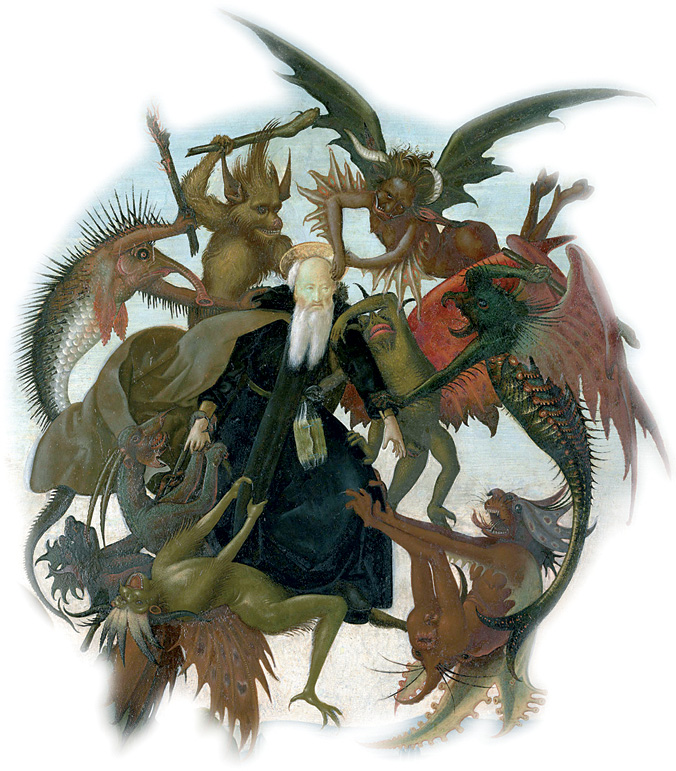St. Anthony is the best known of the Desert Fathers. The Desert Fathers were hermits, ascetics, monks, and nuns who lived mainly in the Scetes desert of Egypt beginning around the third century AD. Saint Anthony was born in the year 251, in Qimn El-Arouse (Cooma) near Herakleopolis Magna in Lower Egypt, to wealthy landowner parents. When he was about 18 years old, his parents died and left him with the care of his unmarried sister. Hearing at Mass the words, “If you would be perfect, go, sell what you have and give to the poor,” he gave away all his vast possessions, staying only to see that his sister’s education was completed, and retired into the desert. He then begged an aged hermit to teach him the spiritual life, and he also visited various solitaries, undertaking to copy the principal virtue of each.
To serve God more perfectly, Anthony walled himself in a ruin, building up the door so that none could enter. Here the devils assaulted him furiously, appearing as various monsters, and even wounding him severely; but his courage never failed, and he overcame them all by confidence in God and by the sign of the cross.

Detail of The Torment of Saint Anthony by Michelangelo (1487-88). One of many artistic depictions of Saint Anthony’s trials in the desert, this painting was copied by the young Michelangelo after an engraving by Martin Schongauer. The painting is in the permanent collection of the Kimbell Art Museum in Fort Worth, Texas (USA)
One night, while Anthony was in his solitude, many devils scourged him so terribly that he lay as if dead. A friend found him in this condition, and believing him dead carried him home. But when Anthony came to himself he persuaded his friend to take him back, in spite of his wounds, to his solitude. Here, prostrate from weakness, he defied the devils, saying, “I fear you not; you cannot separate me from the love of Christ.”
After more vain assaults, the devils fled, and Christ appeared to Anthony in His glory. St. Anthony’s only food was bread and water, which he never tasted before sunset, and sometimes only once in two, three, or four days. He wore sackcloth and sheepskin, and he often knelt in prayer from sunset to sunrise.
His admirers became so many and so insistent that he was eventually persuaded to found two monasteries for them and to give them a rule of life. These were the first monasteries ever to be founded, and Saint Anthony is, therefore, the father of all monks who live a common life.
In 311 he went to Alexandria to take part in the Arian controversy and to comfort those who were being persecuted by Maximinus. This visit lasted for a few days only, after which he retired into a solitude even more remote so that he might cut himself off completely from his admirers.
When he was over 90, he was commanded by God in a vision to search the desert for St. Paul the Hermit. When St. Anthony felt that the day of his departure had approached, he commanded his disciples to give his staff to St. Macarius, and to give one sheepskin cloak to St. Athanasius and the other sheepskin cloak to St. Serapion, his disciple. He further instructed his disciples to bury his body in an unmarked, secret grave.
He is said to have survived until the age of a 105 in 356 AD, when he died peacefully in a cave on Mount Kolzim near the Red Sea.
We quote below from St. Athanasius, The Life of St Anthony, 35-36, 49-50.
St. Anthony’s discernment of spirits
35. When the demons come to you at night and wish to tell what the future holds, or they say, “We are angels,” pay no attention, they are lying. If they praise your asceticism and call you blessed, do not listen, have nothing to do with them. Rather, make the sign of the cross on yourself and your cell, and pray; you will see them disappear, for they are cowards and are terrified by the sign of the Cross, for the Lord overcame them by the Cross. If they still hold their ground, dancing and taking on different guises, do not be afraid or pay any attention to them as if they were good.
36. One can easily tell the difference between good angels and bad, if God gives the grace. A vision of the good ones brings no disturbance. They do not cry out, one does not hear their voice, but their presence is so gentle that the soul is suddenly filled with joy, delight and courage. The Lord who is our joy and the power of God the Father accompanies them. The thoughts of the soul remain calm and untroubled so that, shining brightly, it sees those who appear by its own light. The soul is overcome by a desire for future realities, it longs to be united with them and follow them to heaven. If, being human, some are frightened by the vision of good spirits, they remove their fear with love. The coming and appearance of evil angels brings trouble with noise and shouting, as one might expect from unruly boys or brigands. This produces terror in the soul, confusion and trouble in the thoughts, depression, disgust for ascesis, listlessness, memory of relatives, fear of death and evil desires.
St. Anthony’s way of life
49. Many people came and disturbed Anthony’s quiet life. He was not able to be alone as he wished. And the Lord used Anthony to work wonders. So Anthony was afraid. He said to himself: “I shall become full of pride or others will think I am better than I am.” He thought this over carefully and decided: “I shall go to the Upper Thebaïd. Nobody will know me there.”
His brothers gave him some loaves of bread and Anthony went to sit on the river bank to watch the boats as they passed. He wanted to go on one for the journey. Then a voice came from heaven saying: “Anthony, where are you going? And why?” Anthony was not troubled, he was used to hearing a voice that came to him like this. He answered: “All these people will not let me be quiet. They cause me weariness here and above all they want me to do things I am not able. So I want to go to the Upper Thebaïd.”
The voice spoke again: “Even if you go into the Thebaïd as you want, even if you go down to where the cattle are grazed, you will have twice as much to go undergo. If you truly desire a solitary life, go into the inner desert.” Then Anthony asked: “Who will tell me the way? I do not know it.” At once he was shown some Desert Arabs who were going to take that road. So Anthony went to them and said: “I wish to journey to the desert.” The Arabs readily agreed for God had prepared them so that Anthony’s journey should have a good outcome. Anthony went with them on foot for three days and three nights. He came to a very high mountain. A stream, very clear and pure, ran at the foot of the mountain. Further away, some trees grew on the plain.
50. Anthony liked the place, or rather, God made it pleasing to him; and certainly it was the place the voice had spoken of when he sat on the river bank. The Arabs gave Anthony some loaves of bread before they went on, and he was left by himself on the mountain. He decided to stay there all alone. The Arabs admired Anthony’s courage and they gladly agreed to return by that road to bring him bread. He also had dates from the palm-trees for food. After a time, when the brothers found out where Anthony was, they sent food to him like good children looking after their father. But Anthony saw that they were tired with taking bread to him. He asked the brothers who came to see him: “Bring me a small spade, an axe and some seeds.” They sent him all these things.
Anthony went over the mountain to find a fertile area. He found a place which was suitable, there was even a spring to water the seeds, so he was able to make bread for himself, and he did this each year. He was happy not to cause trouble to anyone anymore. But then guests came to visit Anthony. So he planted some vegetables to give his guests. At first the desert animals came to drink nearby and they damaged Anthony’s young plants. But he gently took hold of one of the animals and told them all: “Why do you harm me? I have done nothing to you. Go, and in the Lord’s name do not come back here again.” After that they kept away, as if they had heard what Anthony said to them.





Facebook Comments